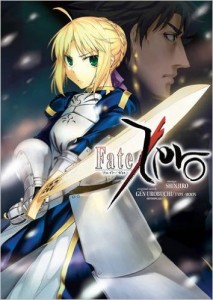By Gen Urobuchi, Type-Moon, and Shinjiro. Released in Japan by Kadokawa Shoten, serialization ongoing in the magazine Young Ace. Released in North America by Dark Horse.
I find myself somewhat relieved that I am familiar with Fate/Stay Night, the original visual novel that this is a prequel to. Admittedly, it makes it hard to judge whether this work can stand on its own for someone who was unfamiliar with this world till they picked it up. My guess is that no, it would be hopelessly confusing, which is why I am relieved. This reads like a prequel everyone wants to see to the game/manga/anime they’ve already experienced, and so it delivers a lot of cool things, but the explanations are to a degree taken as read, or at least glossed over lightly in smug monologues. That said, it’s pretty good at delivering the cool things.
Fate/Stay Night’s manga was never finished here due to Tokyopop’s abandonment of their manga division, so I’m assuming most of the audience here is one that’s seen the various Fate anime versions. Including Fate/Zero, for that matter, which has also been an anime (which I haven’t seen) and which was originally a light novel (which I haven’t read, and isn’t licensed). This prequel takes place during the Fourth Grail War, and features the parents or relations of a great deal of the cast – Shirou’s adoptive father Kiritsugu, his wife Irisviel and their daughter Illya, Rin’s father (who is only briefly seen, and who Rin seems to have inherited her smugness from), and a young Kotomine Kirei, who has not yet been completely horrible but give him time. Thankfully, a few of the servants are the same ones we’ve seen before. Saber is still the King Arturia Saber we know and love, and Archer is Gilgamesh, as the original Fate had made clear.
It does shake up a few things, though. Kiritsugu and Emiya are meant to contrast, and they certainly do, with Kiritsugu’s adaptation of the “needs of the many” maxim meaning he tries to find the most happiness for others by killing those who get in its way – he realizes that you can’t simply save everyone, unlike Shirou later on. And Kotomine’s father seems to be pulling strings for the Church, which is as “unbiased” as ever. The most interesting part of the manga, however, is of the whiny, seemingly bullied Waver Velvet and his servant Rider. This Rider is not the Medusa we’re familiar with, though – it’s Alexander the Great, known here as Iskandar, and he is the main reason to get this volume, as he is awesome. You’d expect him to be contemptuous of his rather whiny master, and you’d be right, but he seems to be training Waver Velvet to be a better person instead of writing him off. They have a wonderful dynamic.
Saber doesn’t get as much to do here, though she does rock a fantastic bodyguard suit, and is as empathic as she was in the original. I like her conversations with Iris, who reveals she’s literally never left the castle where she lives until just now. I’m not sure how long Iris will last in this manga – Fate/Stay Night reminds us she’s dead, and even if it didn’t this prequel is written by Gen Urobuchi, who created Madoka Magica and Psycho Pass. But it has characters we wanted to see doing cool things, and the art is decent (the artist also does the Taboo Tattoo manga), and is definitely worth getting for fans of Fate.


Speak Your Mind